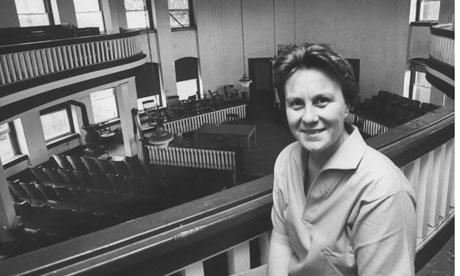
I come not to praise To Kill a Mockingbird but to explain it. And, perhaps, to persuade you that a novel that's merely good can affect more people than one that is great.
My exposure to Harper Lee's sole book, published in 1960, came late – very late. It was only this spring that I spent an evening on the couch with the 1962 movie version. My daughter and her fellow high-school students had read the book, as have millions of other American schoolchildren. I decided it was long past time to plug a rather large hole in my cultural education.
I was deeply impressed, not so much by Gregory Peck's wooden performance as the lawyer Atticus Finch, as I was by Mary Badham, the young girl who played Atticus's daughter, Scout. Never have I seen such a realistic depiction of childhood. The genius of the film is that we see the racial horror of 1930s Alabama through the eyes of an eight-year-old white girl.
Yet several weeks later, when I read the novel, I felt let down. Even though Lee's work is in some respects richer, with characters and scenes that were omitted from the movie, it is also flatter, its flaws more obvious on the page than in the film.
I realised that Atticus came across as one-dimensional not because of Peck's limitations as an actor but because of Lee's limitations as a writer. The magical (for good and ill) childhood depicted in the film seems, in Lee's telling, more mundane and less interesting, Boo Radley less likely to go "boo!"
Seeking to understand my sense of disappointment, I tracked down this 2006 essay in Slate by Stephen Metcalf. His take strikes me as overly harsh. But I think he puts his finger on it in describing Mockingbird, as the novelist Flannery O'Connor did, as "a children's book" – a story of good and evil, without greys or nuance or character development.
But what a children's book. Because what Mockingbird lacks in character development it makes up for in story development. What it lacks in nuance it makes up for in moral clarity. And what it lacks in greys it makes up for in its forceful insistence to white America that black America is its equal. The white-liberal incrementalism embodied by Atticus Finch may seem wan by the standards of today, or even of, say, 1965. But there is a direct link from Atticus to Martin Luther King to Barack Obama.
Last Sunday, I had the privilege of taking part in an event at a local bookstore celebrating the 50th anniversary of Mockingbird. Several of us took turns reading from the novel in front of a small, but appreciative, audience. I chose the scene in which Scout, her brother, Jem, and their friend, Dill, happen upon a would-be lynch mob in front of the jail where Tom Robinson, the black rape suspect, is being held. There is nothing standing between Robinson and his maker except Atticus, armed only with a newspaper. It is Scout who saves Tom's life, and perhaps her father's, by awkwardly engaging with one of the mob leaders, whose son is a schoolmate of hers. Lee writes:
"Atticus said nothing. I looked around and up at Mr Cunningham, whose face was equally impassive. Then he did a peculiar thing. He squatted down and took me by both shoulders.
"'I'll tell him you said hey, little lady,' he said.
"Then he straightened up and waved a big paw. 'Let's clear out,' he called. 'Let's get going boys.'
"As they had come, in ones and twos, the men shuffled back to their ramshackle cars. Doors slammed, engines coughed, and they were gone."
After the reading, several folks in the audience talked about how important Mockingbird had been to them when they were young. One woman, perhaps 10 years older than I, and therefore someone who experienced the civil-rights era at a time when I was in grade school, told us the novel had given a voice and a purpose to her generation.
And it occurred to me that although great art can make us think, it is more often less-than-great art that makes us change the world. Harriet Beecher Stowe's novel Uncle Tom's Cabin, widely mocked, helped spark the anti-slavery movement. John Steinbeck's workmanlike The Grapes of Wrath brought the Depression-era Dust Bowl to life and helped fuel Franklin Roosevelt's social reforms.
By contrast, such first-rate works as Herman Melville's Moby Dick, F Scott Fitzgerald's The Great Gatsby and – especially – Mark Twain's The Adventures of Huckleberry Finn, a story about race as sophisticated as Lee's is simplistic, inspire admiration, not action.
To Kill a Mockingbird is a great movie and a good book. It helped make America a better place. Harper Lee may not have written the Great American Novel. But she might have done something more important.

